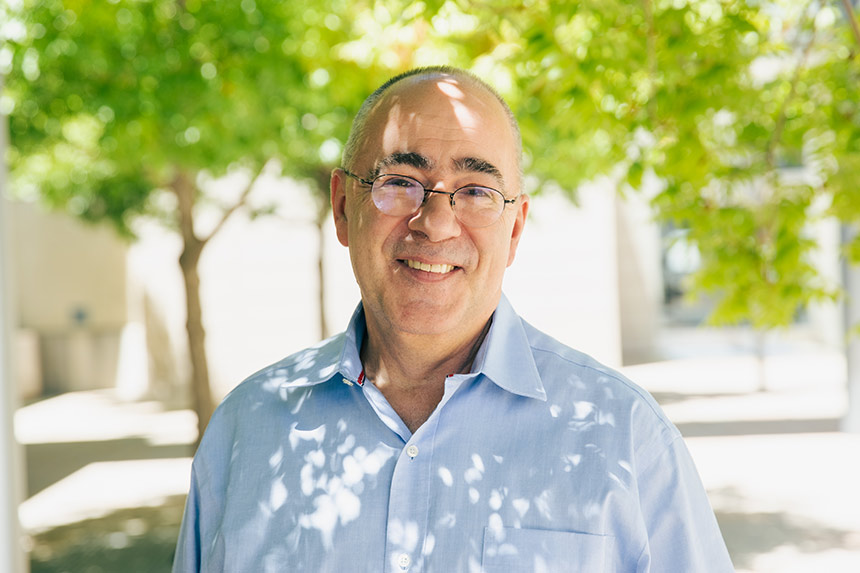
By Andrew Cohen
Professor Hanoch Dagan knows that for some in the legal academy, private law hasn’t become public knowledge even though its core concepts — property, contracts, torts — form the legal building blocks of our daily lives. A new Berkeley Law faculty member this year, he is eager to change that with the launch of the Berkeley Center for Private Law Theory.
“These structures profoundly affect our social and economic life and govern our relationships with each other in arguably the most important spheres of our lives: in the market, the workplace, the neighborhood, and intimate relations,” says Dagan, one of the world’s foremost private law scholars. “Where we define our property rights, the meaning of our contracts, and the meaning of our torts defines us as a society. This is what our center will investigate in different ways.”
The author of seven books and over 120 scholarly articles, Dagan directed during his tenure at Tel Aviv University three centers, which focused on ethics, advanced legal studies, and interdisciplinary research of the law. He also served as dean of the university’s Faculty of Law.
That experience revealed how to integrate students, prioritize projects, and maximize on- and off-campus collaborations.
“Hanoch Dagan is among the most creative thinkers about private law theory,” says Columbia Law School Professor Katharina Pistor, a member of the new center’s advisory board. “His scholarly work has helped reshape the image of property and contract law theory.”
Pistor also hails his “unsurpassed record of building institutions and programs to advance research and writing on these topics,” and adds that “without doubt, his new center at Berkeley Law will become a magnet for students, alums, and colleagues.”
All hands on deck
Dagan wants to reinvigorate interest in private law and consolidate its understanding within the vision of a just society.

“This center should be the home for that, which means involving the knowledge and perspectives of lawyers, philosophers, political scientists, historians, business strategists, and more,” he says. “It will be an international center with global connections.”
The center’s inaugural event, held on Oct. 20, was a colloquium co-organized with Berkeley’s Center for Law and Work that focused on contract theory and marginalized workers. Because labor and employment statutes exclude a significant number of workers from coverage and fail to protect others because of judicial interpretation or immigration law, millions of immigrants, incarcerated people, and independent contractors labor under a regime that offers minimal rights.
“Our main questions addressed what made contract law the enemy of marginalized workers, and whether contract law may become part of the solution for, rather than one of the causes of, the vulnerability of workers to exploitative working conditions,” Dagan says.
Next semester, a workshop on contract theory will take place February 2-3 and a conference on the normative foundations of the market is set for March 15-16. The latter will convene scholars from various market-related disciplines to critically investigate the normative underpinnings that can, should, or in fact do underlie the operation of the market generally or of a specific market, such as labor or housing.
Dagan has enlisted a strong roster of Berkeley Law professors to work with the center, including Abbye Atkinson, Kenneth Bamberger, Andrew Bradt, Seth Davis, Daniel Farber, Catherine Fisk ’86, Stavros Gadinis, Mark Gergen, David Singh Grewal, Prasad Krishnamurthy, Christopher Kutz, Manisha Padi, Dylan Penningroth, Diana Reddy, and Molly Van Houweling.
A visionary scholar
Professor Roy Kreitner, Dagan’s longtime colleague and frequent co-author, calls him “the leading light” of developing a new style of legal realism in three subfields of private law — and in bringing his own encompassing private law theory to fruition.
“Hanoch’s early work rejuvenated the field of restitution law, long thought to be a dead zone,” Kreitner says. “His work on property institutions and his recent work on contracts have made him a preeminent voice on private law writ large. Over the course of that time, his work has become more philosophically sophisticated, and deeply committed to a thick theory of individual autonomy.”
From that theoretical standpoint, Kreitner adds, Dagan has been able to engage — and to do battle — with the entire spectrum of existing scholarship, ranging from philosophically-inspired corrective justice theory to economic analysis and empirical analysis of law.
“That capacity to engage is matched only by Hanoch’s eagerness to challenge accepted ideas, and to expose his own ideas to challenge from others,” Kreitner says. “Hanoch is an intellectual whirlwind, and a leader. Everyone who has the privilege to work with him is enriched by the experience, and taken in by his infectious love of ideas. I know he will bring all his energy to the Berkeley Center for Private Law Theory, and I have no doubt that it will quickly become the hub for the most important developments in the field.”
While Dagan notes that private law has a proud legacy stretching back to antiquity, he sees its current pertinence underscored by a continued intensification of transnational interactions and how modern-day work increasingly centers on organizing global value chains.
“The need for a new generation of private law theory has become all the more acute given questions and challenges posed by rapid technological change, economic globalization, and the rise of new forms of family and personal relations,” Dagan says. “We aim to foster insights into the legal building blocks of our social and economic life and contribute to making them fair and just.”